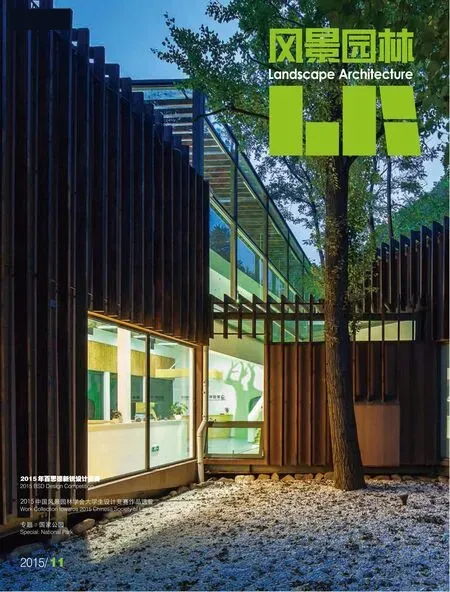刊首语
刊首语

The Chinese Society of Landscape Architecture holds the 2015 annual conference from 31st October to 1st November in Beijing and presents the prizes for the university design competition at the closing ceremony. In this issue, we publish part of the winning works from this university competition.
In China, except for the Chinese Society of Landscape Architecture University Design Competition, landscape architecture students have lots of opportunities to participate in various design competition at home and abroad. The most popular one is the International Student Design Competition of IFLA Word Congress. In June of this year, Chinese students won the Second and Third Prize in the IFLA Student Design Competition. September again, Chinese students included the top three at the International Federation of Landscape Architect in Asia Pacific (IFLA APR) Student Design Competition. Chinese participants always get the satisfied result since the two competitions were established. That is, almost every session of competition, winning the first prize is commonplace for Chinese students. Recent years, it seems the design proposals from other countries or regions student entries would cause the judges more interest and attentions than Chinese. Thus, Chinese will sometimes move to overseas or choose a foreign site for design, hope to make the judges thought that the team is from other country or regions to submit design proposal.
In 1988, Chinese landscape architecture student first won the Honorable Mention in IFLA Design Competition. They are LIU Xiao-ming and QU Jun. Gradually, more and more Chinese designers won award in authentic design competition such as ZHOU Xi, LIN Ying, WU Jun, ZHU Yu-fan and LIN Qing. At that time, it is very hard to finish a design proposal for competition. The information and materials are extremely limited, and then bring big trouble choosing the site location. Furthermore, attending competition is mostly one independent work. Participant must do the design alone without computer. Complete two A0-sized drawings all by hands. Normally, it takes at least one whole month to prepare for. In a tough time for joining the competition, the winner designers would gain a lot and they mostly have become the outstanding designers or excellent teachers.
Since the year of 2000, increasing Chinese students attended and won the prize in IFLA Design Competition. Currently, the participants are always the group work, 4-5 team members together. Besides, they could utilize computer and surf the Internet to save time and raise efficiency. Team competition also help to reduce working strength, members would fulfill their advantages and special skill. So now, the participants will not endure as much pressures and pain as their predecessors have for the competition.
Chinese landscape architecture student will have the comprehensive design training in the college. However, the school work always has a strict schedule and specific restrictions. Students have to follow the lecturer's guidance to do design. There is not enough space for them to have a try and develop. Joining the design competition brings them an uncommon opportunity to develop their design proposal all by themselves and open for them to explore, which draw wide attention and strong interest within undergraduates. Many schools actively encourage students, especially the graduates to selectively participate in design competitions, which would gain a lot of benefits to cultivate the students' comprehensive abilities. The first, the theme for a competition would be comprehensive, sensitivity and foresight, beyond the scope of school teaching. To complete such a good design, students require to do great many researches and reliability consideration, which could inspire students' creative thinking and the ability to solve complex problems. The second, design competition provides students with opportunities to do team work and also cultivate the students' team spirit. The third, due to the excellent drawing expression is essential for winning prize, the participants must improve their ability of drawing performance. The last, of course, the prize would greatly stimulate students' interest in designing. The award-winning also bring them more honor and obtain exposure in their resumes.
Every year, I would guide students to participate in various design competitions. Also, join to evaluate design works for competition as a judge, from which I realize the limitations to a competition and its adverse factors. The biggest problem is that students love to consider how to attract attention of judges. And then, they choose the foreign site or very sensitive areas where the designers are unable to visit and inspect the site personally. In order to get a better result, or more effectively reflect their inspirations, the designers tend to make free adaptations according to their requirements. Besides, they seek for very advanced concept and use fashionable expressions or drawings for competition. I indeed fear such the behavior will cultivate emerging designers the bad habits and gradually misunderstand the correct way of working which would finally affect their future career, especially influence their understanding towards the site and judgment to the design planning.
Compared with other country's landscape architecture students, Chinese have got many IFLA prizes in competition, which proves China gains advanced educational abilities in the landscape architecture domain and students have top design capability. But we still cannot say Chinese must be stronger than foreign students. In fact, only a few students from Europe and America to participate in IFLA competition, they prefer to attend their domestic design competition, such as the American focus on the ASLA award and the German choose BDLA student award. Teachers or students to take part in the design competition have to hold right attitude towards the result, less aggressive, more expectations on self-improvement. The competition often could receive several hundreds submissions, but award evaluation time is limited. The award-winning sometimes has certain opportunities. Thus, the first place is not always the best design beyond all. It is difficult to confirm the winner student would become an excellent landscape architect in the future.
WANG Xiang-rong November 18, 2015

